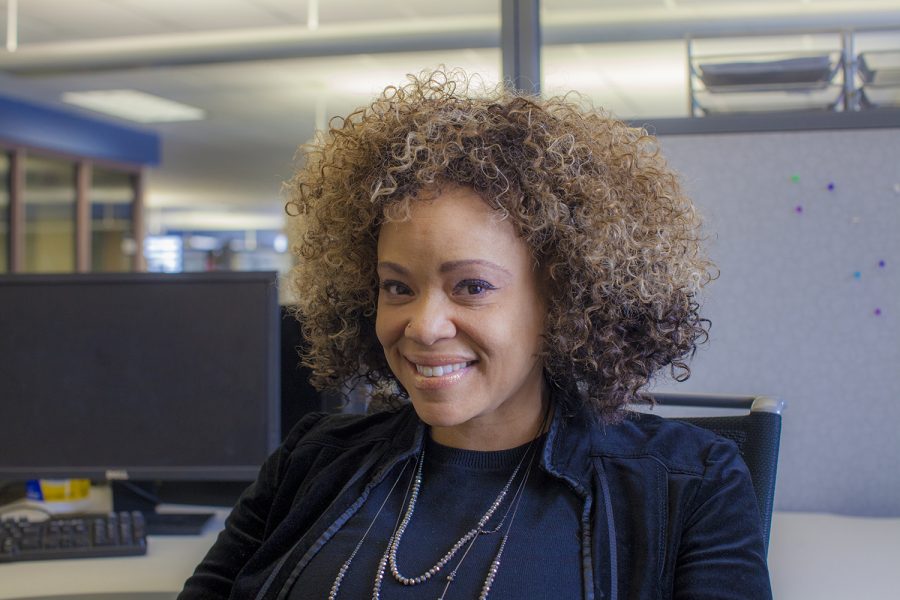Researcher and mentor Deborah Whaley reflects on her female advocacy work
In celebration of International Women’s Day today, UI professor, Deborah Elizabeth Whaley, serves as a role model for women at the UI and the world.
University of Iowa Professor Deborah Whaley poses for a portrait in the University of Iowa Library Digital Studio on Thursday, March 7th, 2019. (Tate Hildyard/The Daily Iowan).
March 7, 2019
Scrolling through Deborah Elizabeth Whaley’s personal website, one can hear the soft Malaysian song “Dan Sebenarnya,” by Yuna, playing in the background: Is this hatred really love that still waits for you? And, to be honest, I hope that behind that smile of yours, you miss me, too.
Whaley, a University of Iowa American studies professor, chose the song for the message of perseverance and realizing one’s dreams, an interpretation she embraces closely.
While she is originally from Colorado, Whaley has lived in the Midwest for more than half her life. She described herself as an artist, poet, writer, curator, swimmer, yogi, and UI professor.
Whaley’s work has encompassed American and cultural studies, and she has published many pieces of literature on social movements. Her recent book, Black Women in Sequence: Reinking Comics, Graphic Novels, and Anime explores book production and African Americans in media.
One of Whaley’s roles at the UI is serving as a senior scholar for Digital Arts and Humanities Research, where she got to know Associate Professor Sarah Bond.
“[Whaley] is a pioneer in the study of black history, and we both enjoy writing for the public,” Bond said. “Deborah is a really big part of why things are successful, and the digital humanities is successful because of her.”
Whaley developed an interest in advocating for women through her profession stemming back from her time in college as an undergraduate at the University of California-Santa Cruz, she said in an email.
“In college, I had a sociology professor who taught her class through a feminist perspective,” Whaley said. “Until then, I never thought about feminism as an identity or feminist frameworks, though of course I was always for women’s equality. I was 17 at the time, a very young college student, and the impact of that course and later, other courses I took in American studies all dealt with making historically marginalized groups in conflict the center of the courses.”
Whaley said her advocacy grew from her undergraduate years and decided she needed to do more with it.
“I was trained in terms of my education to advocate for and try to make a difference — through actions and scholarship — for the conditions historically marginalized groups face,” Whaley said. “My interest in advocacy for women as an artist, teacher, public intellectual, writer, and frequent guest speaker on these topics stems from witnessing, learning about, and experiencing unequal treatment as a woman and particularly as a black woman.”
RELATED: FilmScene celebrates women filmmakers during Women’s History Month
Tippie College of Business Dean Sarah Gardial described Whaley as an “awesome woman” she has gotten to know at the UI.
“From a faculty point of view, she is doing cutting-edge cultural work that affects her students and faculty,” Gardial said. “She is finding herself moving into leadership programs and is really excited. Someone like her in leadership positions will better the UI.”
Though her work encompasses many problems historically marginalized groups face with representation in various matters, she highlighted her current work on a book with examining why dissociative identities is a popular narrative in daytime talk shows, soap operas, foreign films, music, and more dating back to 1860, she said.
“More than an interpretation of popular-cultural productions, my book also examines how women interface with the medical industrial complex, and how disability and affect studies act as a lens through which we might understand the cultural use of and interrogate the practices of medicine’s creation of iatrogenic conditions,” Whaley said.
She also noted the importance of days such as International Women’s Day in actively addressing societal struggles.
“Activism can look very different, and it is important to value the various ways people enact and envision change,” Whaley said. “A day of remembrance as a day of action and recommitment to the struggle is what International Women’s Day will hopefully continue to do to the ends of a more just society.”



